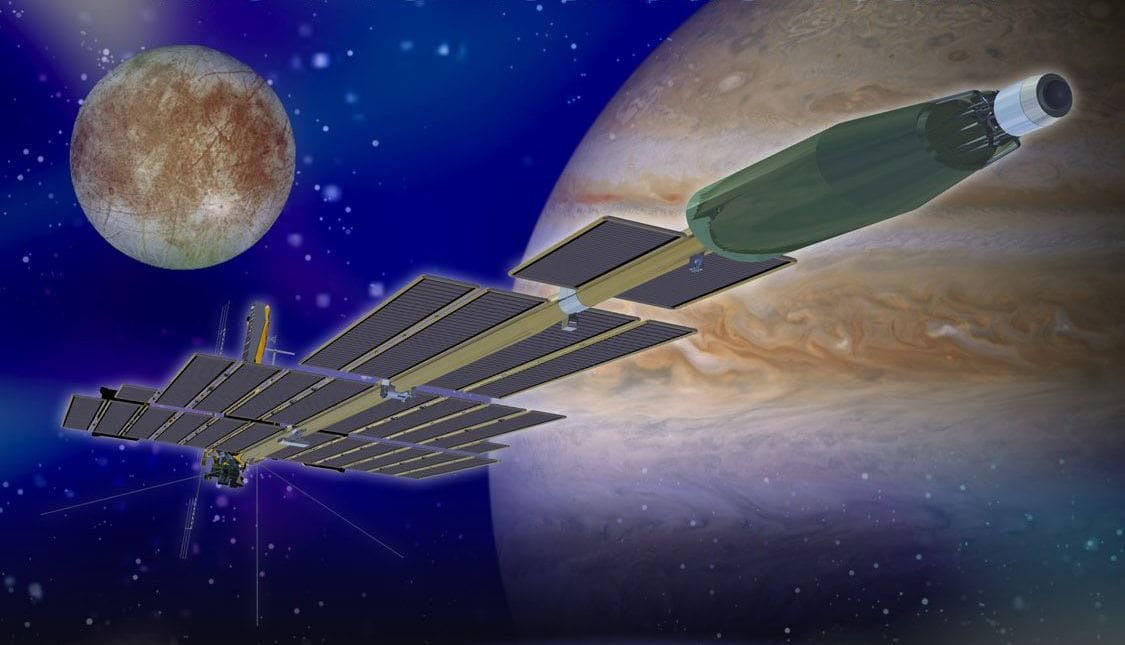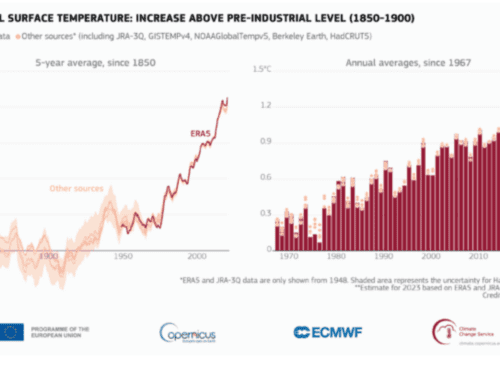

Decisions on a Nuclear Future are Guided by Myths


Artists’s Conception of Jupiter Icy Moons Orbiter mission for Prometheus, with the reactor on the right, providing power to ion engines and electronics. – Public Domain
Last month I rushed through the august halls of the British parliament in Westminster, on my way to a briefing on small modular reactors for Members of the Welsh Affairs Select Committee.
Running late though I was, it was tempting to slow down and take in all the historic portraits and portals as I hurried down flagstoned hallways, through heavy oak doors and finally into the richly carpeted committee room. But the albeit fleeting impression all of this left was of a world completely isolated from the reality of the daily struggles most of us endure. The rarified air was almost suffocating.
This became even more apparent as, unwillingly gagged, I listened to testimony from executives representing Westinghouse, Bechtel and Rolls Royce. One unsubstantiated sound bite after another tumbled from the mouths of these corporate executives, all serving their rich agenda of vested interests (read shareholders and profits).
But the questions they faced, at least from the Conservative nuclear cheerleaders present, were mainly mild softballs. Give us the soundbite, they urged. What do we need to tell the government to do to make all this happen?
Even Labour MP, Beth Winter, while challenging them on the obvious detriments of small modular, or any, reactors — time and cost — given, as she pointed out, climate change is very much here now, politely did not expose their utter hypocrisy. It was, after all, not a room in which arguing was on the agenda.
The Rolls Royce response was to trot out the “we need to do everything” mantra, which is what nuclear companies have to say in order for their technology to stand any chance at all. In reality, it is clear that choosing nuclear cancels out renewables. Meanwhile, Rolls Royce has pocketed — and presumably invested — £250 million (around $302 million US) with which it has done precisely nothing. But that’s the government’s fault, the company says. We just need to get in a room and get things done.
Fortunately, the gallery was under a mandatory code of silence, for it was hard not to emit a gasp of incredulity when the Westinghouse executive announced that his company had been “smashing production records” around the world.
Westinghouse has indeed broken some things: the law, and the bank for starters. But production records? He also mentioned that nuclear was “clean, reliable, dependable power” the very things it is not.
All of this was both a reminder of, and an eye-opener to, exactly the kind of false propaganda our elected officials are continuously exposed to, and swallow whole-heartedly. This is who they listen to: the corporate elite, in the United States bearing gifts as well, often in the form of generous campaign contributions. The politicians bought literally and figuratively by the major corporations, including nuclear power companies, dwell in an echo chamber filled with hot air. It’s not reality.
What was happening in that room in Westminster was also utterly pointless. Sitting there listening to 90 minutes of valuable time squandered in the stubborn pursuit of learning something more about a completely futile technology that has zero applicability to the climate or the immediate jobs crisis, it struck me that this was yet another symptom of humanity’s general malaise.
Or is it something worse than that? Being hell bent on wasting time and money talking about something entirely irrelevant no matter what the empirical evidence that should dismiss the continued use of nuclear power out of hand, must surely be a sign of some kind of madness?
A few weeks later, that same presentiment was re-evoked on reading a headline in the print edition of the Washington Post: US works on nuclear-powered rocket.
This is not an entirely new story, but an update on the plan to use thermonuclear propulsion technology to power a rocket to Mars.
There are so many things wrong with this. The premise is that not using a nuclear reactor to power the rocket will mean it will just be too tediously slow for human passengers to endure — a journey of seven months. With the reactor on board speeding the rocket on its way, the journey to Mars could be cut to what? A mere three and a half months. Not tedious at all!
Never mind that rockets have a nasty habit of sometimes exploding on the launch pad. And never mind that do we REALLY need to spend billions of dollars right now trying to get maybe three astronauts to Mars when we have a planet called Earth that desperately needs every dime and dollar available to save it?
The announcement was replete with the usual illogicalities. Sending astronauts on that seven-month journey to Mars in a traditional rocket was “dangerous” as “the radiation levels on a Mars mission could expose astronauts to radiation levels more than 100 times greater than on Earth.” Much better to send them there on a rocket powered by a nuclear reactor!
There is another agenda afoot here, of course, and it’s a military one and the sinister battle for who controls space.
If you thought shooting down the Chinese spy balloon was exciting, that was child’s play compared to what is planned for NASA’s nuclear reactors in space.
This includes being able to power satellites to become more agile in maneuvering away from “enemy” satellites. Using nuclear propulsion will achieve that, but what other consequences might result from a host of nuclear powered satellites buzzing around in space? It’s no surprise that the Space Force, created for war-fighting in space, is involved in all this.
And of course, apparently taking its cue from the mess we have already created on Earth, NASA wants to place nuclear reactors on the Moon as a power source. But for who or what exactly? Will we plant the US flag there while we are at it and claim a new military and strategic frontier? The signs are ominous.
And what about all the radioactive waste? Will we be boring deep holes in the Moon to bury it, or will we simply jettison it further into deep space? It’s bad enough that the oceans are already our dustbin. Now Space is to be our new nuclear waste frontier.
While all this was going on, evidence from yet more research poured in about how completely unnecessary it is to use nuclear power for anything, now or in the future.
Looking at every kind of power demand including energy consumption, electric vehicles, and commercial transport, then applying solar, wind, nuclear, heat pumps, storage and other technology, nuclear power was repeatedly eliminated from the mix for increasing costs without increasing reliability.
And yet, governments here and in far too many other parts of the world press on inexorably with plans to continue the use of nuclear power or develop new nuclear programs.
Despite all the evidence that this is — to understate it — a Very Bad Idea.
This first appeared on Beyond Nuclear International.
Linda Pentz Gunter is the editor and curator of BeyondNuclearInternational.org and the international specialist at Beyond Nuclear.







